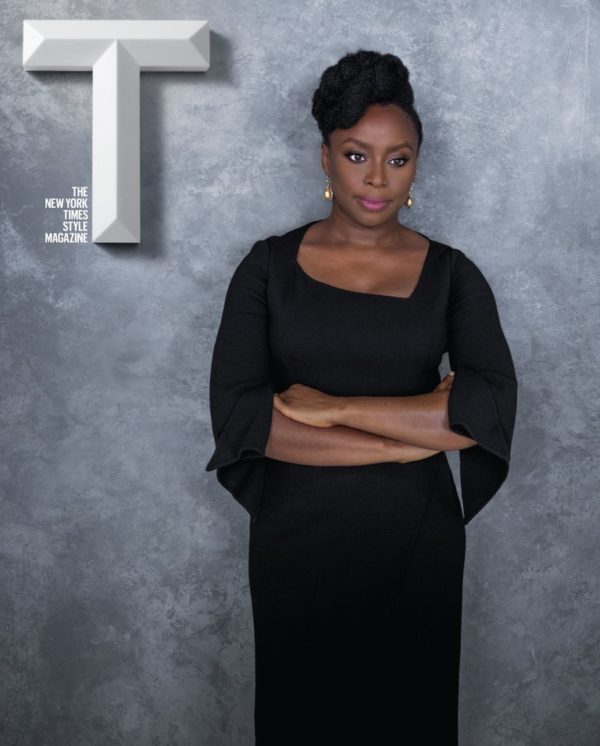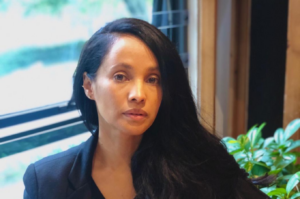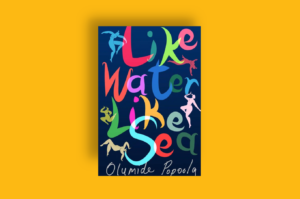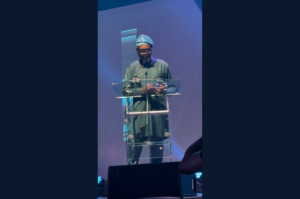
Chimamanda Ngozi Adichie is one of the seven artists on seven covers of The New York Times Style Magazine T’s “The Greats” issue, a celebration of people who are “masters in their fields.” The other six are the rapper Nicki Minaj, the actress Amy Adams, the theater director Park Chan-Wook, the artist Claes Oldenburg, the composer Steven Sondheim, and the fashion designer Dries van Noten.
The profile of her in the issue, titled “Chimamanda Ngozi Adichie, a Humanist On and Off the Page,” is by the American novelist Dave Eggers, editor of McSweeneys and 2005 TIME 100 person. Eggers, who has known Adichie for a decade and once taught at her Farafina Workshop, contributed blurbs to Half of a Yellow Sun and Americanah. He describes her as “the rare novelist to become a public intellectual — as well as a defining voice on race and gender for the digital age.” His piece reveals some personal sides to the her “exalted reputation.”
Here is an excerpt.
NOT LONG AGO, Chimamanda Ngozi Adichie stood in front of a small class of literature students at Cardozo high school in Washington, D.C. Over the last few years, Adichie’s books have appeared on thousands of required-reading lists — more or less every American student between 14 and 22 has been assigned her work.
While introducing her, Dr. Frazier O’Leary, the class’s soft-spoken teacher, mentioned that Adichie had visited at the school a few years before, and that between that visit and this one, Adichie had had a daughter, now 23 months old. Then he ceded the floor to Adichie. She stood before the 20-odd students, her fingertips on the podium, and swept her almond eyes around the room.
“So, what should we talk about?” she asked. In front of an audience, Adichie speaks with great precision, measuring every word, her Nigerian-British accent sounding to American ears both opulent and daunting.
No one raised their hand.
Adichie was wearing a T-shirt that read, in glittering letters, “We Should All Be Feminists,” and she carried a Christian Dior bag that bore the same message, both inspired by her 2012 TEDx Talk, which has been viewed over four million times. The students had been assigned to read Adichie’s essay based on the talk, and thus it was dispiriting when the first question came from a young man, originally from Ghana, who very politely asked how Adichie was balancing her work with the responsibilities of motherhood.
She looked down and smiled. She took her time, and then, with her chin still lowered, she raised her eyes to look kindly at the student.
“I’m going to answer your question,” she said, “but you have to promise me that the next time you meet a new father, you ask him how he’s balancing his work and the responsibilities of fatherhood.”
The young man shrugged. Adichie, who is 40, smiled warmly at him, but thereafter, the class, already intimidated and shy, grew only more so.
“Why don’t I read a bit?” she said finally, and she did.
*
In Nigeria, Adichie is considered a national icon, not only because her books have garnered such acclaim, but because quickly after her success she founded the Farafina Trust Creative Writing Workshop, a program where aspiring Nigerian writers spend a few weeks every year workshopping with Adichie and a coterie of international writers she brings to Lagos. She invited me to teach there in 2009, and I got the chance to meet her family and friends, all of whom were supportive, kind, funny, devoted — it was all sickeningly perfect.
One night, it became the obsession of one of the guest lecturers, the Kenyan writer Binyavanga Wainaina, to bring Adichie to one of Lagos’s seamier nightspots. He asked her where that would be. She had no idea. “I’m a nice middle-class girl,” she said, laughing. “I don’t know about such places.” She was serious, though. She did not know.
So we called Adichie’s childhood friend Chuma. He suggested Obalende, a district of Lagos known for its nightclubs and strip clubs. Chuma picked us up and drove us to a neighborhood where fish and plantains were fried on the street, where the air was swampy with weed. He chose a club with a slanted roof of corrugated steel and Fela bursting from the sound system. We sat outside on a humid night, Adichie game but wide-eyed. We were visited by a street musician who would not leave. Adichie requested Fela’s “Unknown Soldier” and he played it, and we stayed late, and most of us got tipsy — even Adichie; she had one drink — and at the end of the night, I was the only one fit to drive, which I did, which everyone thought very funny, especially when we were pulled over by a traffic cop, who wanted a bribe. I did what I always do in that situation, which was to act like the world’s dumbest tourist, and it worked. He let us go, and Adichie, in the back seat, laughed all the way home.
Read the full profile HERE.
Congratulations to Chimamanda. Unstoppable.









COMMENTS -
Reader Interactions